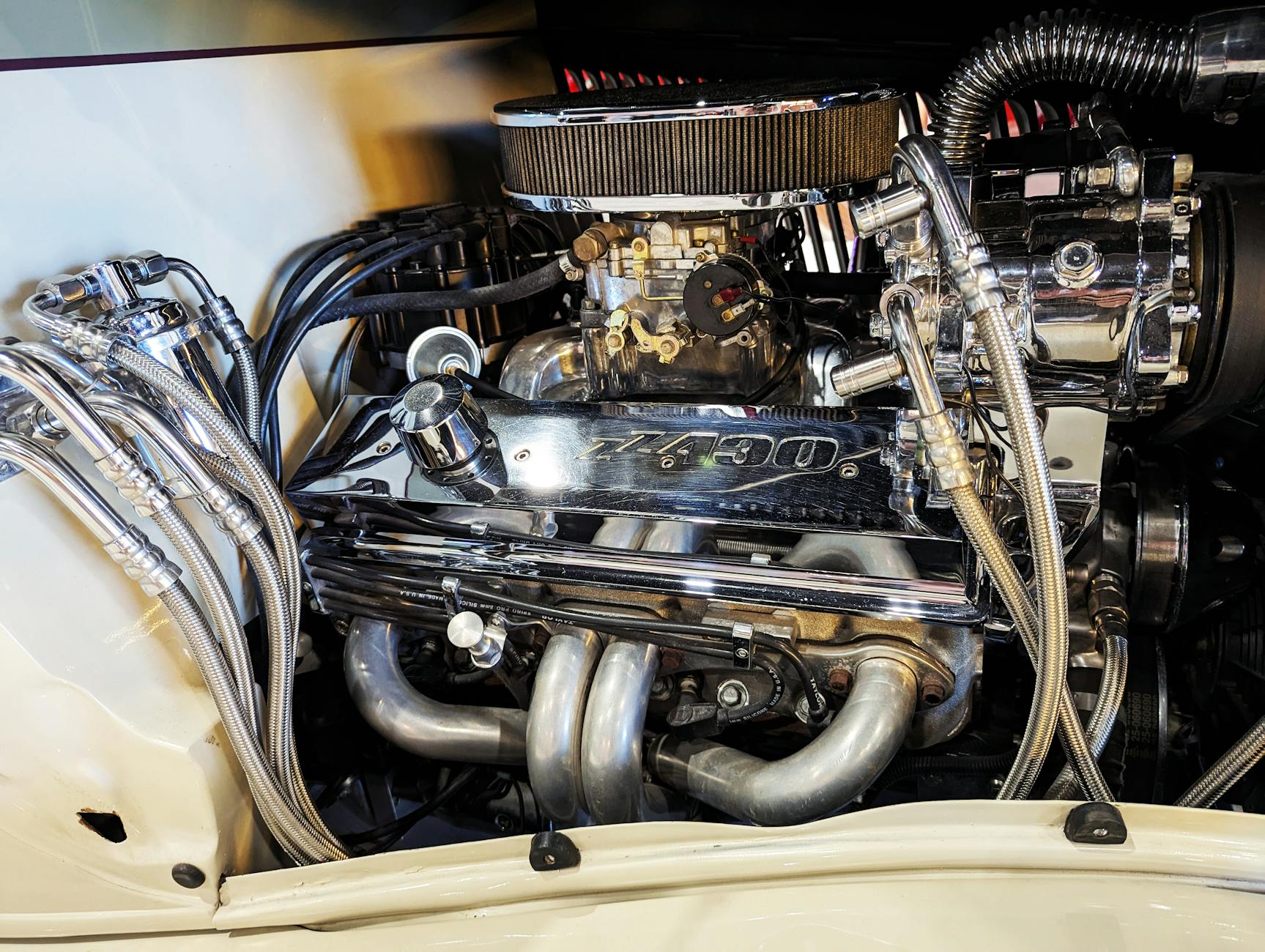Engine replacement involves removing an existing engine that is beyond repair or no longer meets performance standards and installing a new or refurbished unit in its place. This process can rejuvenate an aging vehicle, restoring or even enhancing its performance, efficiency, and reliability. Engine replacement is a critical decision for vehicle owners facing significant engine problems, offering a fresh start for their cars' powerhouses.

Understanding Engine Replacement
What is Engine Replacement?
Engine replacement involves removing an existing engine that is beyond repair or no longer meets performance standards and installing a new or refurbished unit in its place. This process can rejuvenate an aging vehicle, restoring or even enhancing its performance, efficiency, and reliability. Engine replacement is a critical decision for vehicle owners facing significant engine problems, offering a fresh start for their cars' powerhouses.
The Critical Nature of Timely Engine Replacement
Delaying engine replacement can lead to a host of complications, including reduced performance, increased fuel consumption, and even complete vehicle breakdown. Timely recognition of engine failure signs and proactive decision-making can save car owners from more costly repairs or the need for an entirely new vehicle, providing a more economical solution to extending a vehicle's lifespan.
Determining the Need for Engine Replacement
Signs That Indicate the Need for an Engine Replacement
Recognizing when an engine needs replacement is crucial for maintaining your vehicle's performance and avoiding more significant issues down the line. Key indicators include excessive smoke from the exhaust, unusual noises (such as knocking or rattling), loss of power, increased oil consumption, persistent check engine light, and regular overheating. These signs suggest that the engine may be facing irreparable damage or wear, signaling the need for a thorough evaluation.
The Role of Diagnostic Tests in Identifying Engine Issues
Diagnostic tests play a vital role in accurately identifying engine problems and determining whether an engine replacement is necessary. Professional mechanics use a variety of diagnostic tools to assess the engine's condition, including computerized scanners that read error codes from the engine's control unit. These tests can pinpoint specific issues, allowing for a more informed decision between repairing the existing engine or opting for a replacement.
Options for Engine Replacement

Comparison of New, Rebuilt, and Used Engines
When it comes to replacing your vehicle's engine, there are three primary options: new, rebuilt, or used engines. Each option offers different advantages and disadvantages:
- New Engines offer the latest technology and come without any wear, providing the most reliable and long-lasting solution. However, they are the most expensive option.
- Rebuilt Engines have been disassembled, cleaned, inspected, and repaired with new parts as necessary. They offer a good balance of reliability and cost, making them a popular choice for many vehicle owners.
- Used Engines are the most cost-effective option, sourced from vehicles that have been totaled or otherwise decommissioned. While they provide an immediate, budget-friendly solution, their future reliability can be uncertain due to the unknown history of wear and usage.
Pros and Cons of Each Engine Type
- New Engines:
- Pros: Maximum reliability, latest technology, usually comes with a warranty.
- Cons: Highest cost, potentially higher insurance premiums.
- Rebuilt Engines:
- Pros: More affordable than new, reliable if well-rebuilt, often come with a warranty.
- Cons: Quality depends on the rebuilder, slightly less reliable than new.
- Used Engines:
- Pros: Lowest upfront cost, suitable for older or less valuable vehicles.
- Cons: Unknown history, potential for future repairs, typically no warranty.
Factors Influencing Engine Replacement Cost
Impact of Vehicle Make and Model
The make and model of your vehicle significantly affect the cost of engine replacement. Luxury and performance vehicles typically require more expensive engines and labor costs due to the specialized nature of their components and the expertise required for installation.
Labor Costs: Regional Variations and Influencing Factors
Labor costs can vary widely based on the region and the complexity of the engine replacement. Specialized tools and equipment may be required, adding to the overall cost. Choosing a reputable mechanic or service center is crucial to ensure quality workmanship, which can ultimately save money by avoiding future problems.
Additional Repairs That May Accompany Engine Replacement
Often, replacing an engine provides an opportunity to address other vehicle issues, such as the cooling system, transmission, or exhaust system. While these additional repairs can increase the overall cost, they can also extend the lifespan and improve the performance of the vehicle post-replacement.
Average Costs and Budgeting

Breakdown of Costs for New, Rebuilt, and Used Engines
The cost of engine replacement varies widely, depending on the type of engine and the vehicle:
- New Engines: Costs can range from $3,000 to $7,000, excluding labor.
- Rebuilt Engines: Typically range from $2,500 to $4,000, plus labor.
- Used Engines: Can be as low as $400 to $700, with additional labor costs.
Tips for Setting a Realistic Budget for Engine Replacement
Setting a realistic budget for engine replacement involves considering not only the cost of the engine but also labor, additional parts, and potential repairs. Researching and obtaining multiple quotes can help ensure you are getting a fair price. Additionally, exploring financing options or warranties can alleviate some of the financial burdens associated with engine replacement.
DIY vs. Professional Engine Replacement
Analyzing the Feasibility of DIY Engine Replacement
Pros:
- Cost Savings: Opting for a DIY engine replacement can significantly reduce labor costs, making it an appealing choice for those with mechanical skills.
- Learning Opportunity: It presents an excellent opportunity for enthusiasts to deepen their understanding of their vehicle’s mechanics.
Cons:
- Technical Challenges: Engine replacement is a complex procedure requiring specific tools and a high level of expertise.
- Risk of Errors: Mistakes can lead to further damage or necessitate professional intervention, potentially increasing the costs.
Benefits of Professional Engine Replacement Services
Pros:
- Expertise: Professionals possess the necessary skills and experience to handle complex replacements, ensuring the job is done correctly.
- Time Efficiency: A professional service can complete the job more quickly, minimizing downtime.
- Warranty: Most professional replacements come with a warranty, providing peace of mind and protection against future issues.
Cons:
- Cost: The primary downside is the higher cost due to labor charges.
Selecting the Right Engine for Your Vehicle
Ensuring Compatibility and Meeting Performance Expectations
Choosing the right engine involves considering compatibility with your vehicle to avoid potential issues. It's essential to match the engine type (new, rebuilt, used) with your vehicle’s requirements and your performance expectations. Consulting with a professional can help in making an informed decision.
The Economic Aspect: Performance vs. Fuel Economy
Balancing the desire for improved performance with fuel economy is crucial. While a more powerful engine might offer better performance, it could also lead to increased fuel consumption. Consider your priorities and how the engine replacement aligns with your long-term vehicle usage plans.
Navigating the Engine Replacement Process
Step-by-Step Guide to the Engine Replacement Process
- Diagnosis: Confirm that engine replacement is necessary through professional diagnostics.
- Engine Selection: Choose the type of engine based on your needs, budget, and vehicle specifications.
- Finding a Mechanic: Select a reputable mechanic or service center experienced in engine replacements.
- Preparation: Ensure all necessary parts and tools are available before beginning the process.
- Installation: The old engine is removed, and the new or refurbished engine is installed.
- Testing: Post-installation, the engine and vehicle are tested to ensure everything operates correctly.
Choosing a Reputable Mechanic or Service Center
Selecting the right mechanic or service center is critical. Look for certifications, positive reviews, and recommendations from trusted sources. Discuss the process, costs, and any warranties offered before proceeding to ensure transparency and trust.
Aftercare and Maintenance
Recommended Maintenance Schedule for the New Engine
Following a strict maintenance schedule is crucial for the longevity and performance of your new engine. Initially, this involves regular checks and possibly more frequent oil changes to ensure everything is functioning correctly. Adhering to the manufacturer's recommended maintenance intervals for oil changes, belt replacements, and other engine-related services can prevent premature wear.
Tips for Extending the Life of Your New Engine
- Regular Oil Changes: Use high-quality oil and change it at recommended intervals.
- Cooling System Maintenance: Ensure the radiator and cooling system are regularly checked and maintained to prevent overheating.
- Avoid Aggressive Driving: Gentle acceleration and avoiding high speeds can help reduce engine wear.
- Regular Checkups: Regular diagnostics can catch and address minor issues before they escalate.
Insurance and Warranty Considerations
Understanding Warranty Coverage for Different Engine Types
Warranty coverage varies significantly between new, rebuilt, and used engines. New engines typically come with the most comprehensive warranties, often covering 3 years or more. Rebuilt engines may have shorter warranty periods, while used engines often have limited or no warranty. Understanding the specifics of your engine's warranty can save you significant expenses in case of future issues.
Managing Insurance Claims Related to Engine Replacement
If your engine replacement is necessitated by an incident covered under your vehicle's insurance policy, such as an accident or theft recovery, you may be eligible for compensation. It's essential to communicate with your insurance provider early in the process to understand your coverage and the documentation required to support your claim.
The Impact of Engine Replacement on Car Value
Resale Value Considerations
An engine replacement can both positively and negatively impact your vehicle's resale value. On one hand, a new or rebuilt engine may increase the vehicle's appeal to potential buyers, offering them a car with a reliable, long-lasting engine. On the other hand, the need for an engine replacement may raise concerns about the vehicle's overall condition and maintenance history.
Perception of Engine Replacement in the Market
The market's perception of engine-replaced vehicles varies. Enthusiasts and knowledgeable buyers may value the investment in a new engine, especially if it enhances performance or reliability. However, general buyers may be wary, concerned about why the replacement was necessary. Transparently sharing the engine replacement history and documentation can help mitigate these concerns and highlight the value added to the vehicle.
Case Studies and Real-World Examples
Successful Engine Replacement Stories
Case Study 1: Family SUV Engine Replacement
- Background: A 2012 family SUV with over 200,000 miles began experiencing significant engine failure.
- Decision Process: Given the vehicle's overall good condition and the family's attachment, the decision was made to replace the engine rather than purchase a new vehicle.
- Outcome: A rebuilt engine was selected for its balance of cost and reliability. The replacement cost $4,500, including labor. The SUV has since run smoothly for an additional 100,000 miles without major issues, justifying the investment.
Case Study 2: High-Performance Vehicle Upgrade
- Background: An owner of a 2015 high-performance sports car sought not only to replace a failing engine but to upgrade for better performance.
- Decision Process: The decision was made to install a new, higher-spec engine designed for enhanced performance.
- Outcome: The engine replacement and upgrades cost $15,000. The vehicle now outperforms its original specifications, greatly increasing the owner's satisfaction and the car's potential resale value.
Case Study 3: Vintage Car Restoration
- Background: A classic car enthusiast aimed to restore a 1960s vintage car, requiring a period-correct engine replacement.
- Decision Process: Finding a period-correct, rebuilt engine that maintained the car's authenticity was essential.
- Outcome: The engine, sourced at a cost of $8,000, was restored and installed, significantly increasing the vehicle's value and appeal to collectors. The car's restoration, with an authentic engine, ensured its historical value was preserved.
Cost Analysis of Engine Replacement in Different Scenarios
These case studies demonstrate the diverse scenarios in which engine replacement can be a viable option, from extending the life of a family vehicle to enhancing a performance car or restoring a vintage classic. The decision-making process involves considering the vehicle's value, both emotional and financial, alongside the cost and expected outcome of the engine replacement.
Frequently Asked Questions
- How do I know if my vehicle needs a new engine or just repairs?
- Engine diagnostics and professional assessments are crucial in determining whether repair or replacement is the most cost-effective solution.
- Can engine replacement really save money in the long run?
- Yes, especially if the vehicle is in good condition otherwise. Replacement can extend a vehicle’s lifespan significantly, avoiding the higher costs of purchasing a new vehicle.
- What should I look for in a mechanic or service center for engine replacement?
- Seek experienced professionals with good reviews and transparent pricing. Certifications and warranties offered are also important considerations.
- How does engine replacement affect my vehicle's warranty?
- For newer vehicles, ensure the replacement engine and the installation process do not void any existing warranty. Always clarify this with your service provider.
- Is it worth replacing the engine in an older vehicle?
- This depends on the vehicle's condition, its sentimental value to you, and whether the cost of replacement justifies the extension of its usable life.
Environmental Considerations of Engine Replacement
In today's environmentally conscious world, considering the ecological impact of major automotive repairs, including engine replacement, is crucial. Engine replacement can be seen not only as a financial or performance decision but also as an opportunity to contribute to environmental sustainability.
Reducing Waste
Choosing to replace an engine rather than disposing of the entire vehicle can significantly reduce waste. An engine replacement extends the life of the vehicle, minimizing the need for new vehicle production and the associated environmental impact.
Improving Efficiency and Emissions
New or rebuilt engines often incorporate newer technologies that can improve fuel efficiency and reduce emissions. By upgrading to a more efficient engine, vehicle owners can contribute to decreased air pollution and lower greenhouse gas emissions, aligning personal transportation choices with environmental responsibility.
Recycling and Disposal of Old Engines
Proper disposal of the old engine is another environmental consideration. Many parts of an engine can be recycled, reducing the need for new raw materials and the energy consumption associated with manufacturing new components. Choosing a service provider that follows environmentally responsible practices for disposal and recycling can further enhance the ecological benefits of engine replacement.
Conclusion
Engine replacement is a multifaceted decision involving considerations of cost, performance, vehicle value, and even environmental impact. This guide has explored the critical aspects of engine replacement, from recognizing the need and weighing the options to navigating the replacement process and understanding its broader implications. Armed with this knowledge, vehicle owners can make informed decisions that enhance the longevity and performance of their vehicles, maximize financial investment, and contribute to environmental sustainability.
Whether facing an immediate need for engine replacement or considering future vehicle maintenance strategies, the importance of informed decision-making cannot be overstated. By carefully evaluating the options and outcomes, vehicle owners can ensure that their decisions not only serve their immediate needs but also align with long-term goals and values.


